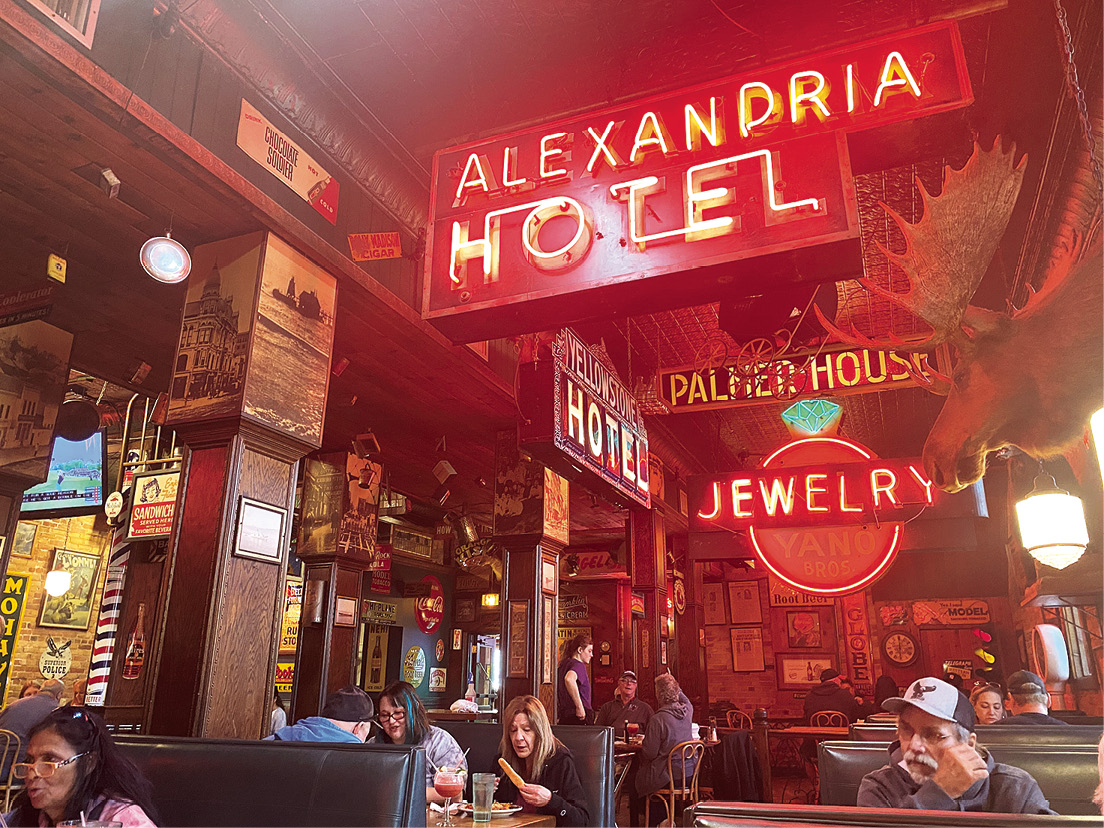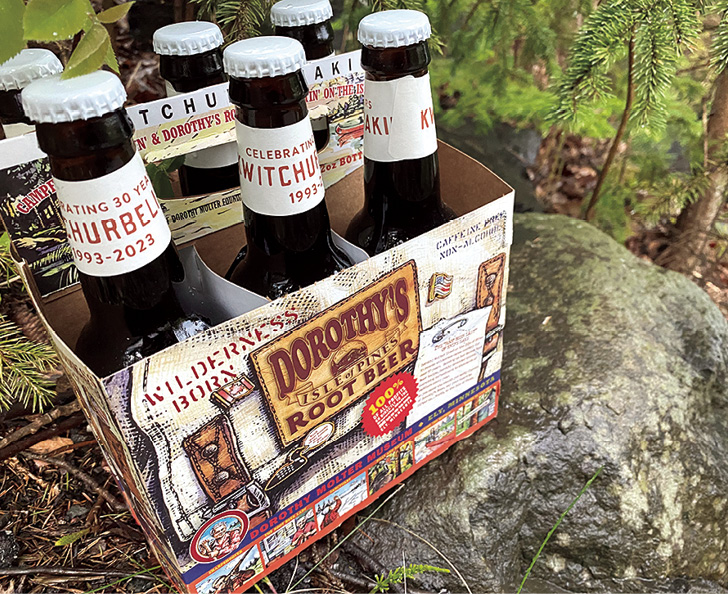Legacy is an interesting thing. As individuals, our legacy is the influence we hope to leave behind when we are gone. The love and wisdom we shared, the choices we made, and the way the world was changed because of our presence in it.
For a business, legacy can mean something a little different. Perhaps, the reliability and stability of a restaurant within its community, creating a consistent space to meet and gather and dine with those we love. Businesses also leave a financial impact by providing employment and sometimes changing the face of a community.
Legacy. Tradition. These things mean something to us as humans. Grandma’s Saloon and Grill has forever changed the landscape of Canal Park, and has continued to be a part of family traditions and stable employment for almost five decades. Dorothy Molter was an individual whose interactions with the world around her left people with a sense of care, and a pretty solid root beer, and whose legacy continues today.
Grandma’s Saloon and Grill, Duluth
Few restaurants in the region have the legacy that Grandma’s has, and the origin story of Grandma’s Saloon and Grill is fascinating. In 1976, acquiring a liquor license meant purchasing it from another business, so the Sand Bar sold to Mick Paulucci and Andy Borg, and their vision for Grandma’s Saloon and Grill gained traction. The restaurant was officially opened in February 1976 in the same building that Rosa “Grandma” Brochi operated out of from 1869 until she returned to Europe in 1944. Grandma dealt in other forms of customer service, but her hard-working demeanor and smart business practices became legendary, and her cheeky, hard-working ethic became a foundation of Grandma’s Saloon and Grill.
At the time, Canal Park was a junkyard and warehouse district that brought little appeal to foot traffic, far from the bustling mecca of tourism it is today, but it didn’t take long until the restaurant was gaining attention and turning away hundreds of customers per day. Over the years, Grandma’s has constantly adapted in order to find their niche, including opening and closing stores in the Twin Cities and Carolinas. (Apparently the wild rice we adore did not go over so well in the low country of the Carolinas.)
Borg and Paulucci began in the antique business, and if you really want a glimpse of North Shore legacy, all you need to do is walk through Grandma’s. The restaurant is decorated with vintage tools, trinkets, stained glass, neon signs, and salvaged tin signs from northern Minnesota junkyards. It is an eclectic décor that keeps your eyes and your mind continually intrigued.

As for the menu, Grandma’s Saloon and Grill has always had an interest in unique and delicious cuisine. Today, you will find several of the original menu items still offered, like the Tricycle Burger or the Rosa ‘N Reuben. A Minnesota-born restaurant, Grandma’s has found a variety of ways to include wild rice (or swamp grass, to the Carolinians). From stuffed wild rice mushrooms to wild chicken salad (complete with cranberry wild rice toast) and Grandma’s wild rice burger, Grandma’s Saloon and Grill has found interesting and delicious ways to incorporate our beloved manoomin into their cuisine.
You may also be familiar with Grandma’s name via the 10th largest marathon in the United States: Grandma’s Marathon. Interestingly, the marathon’s first year was 1977, just a year after Grandma’s Saloon and Grill opened. Grandma’s was the only business willing to sponsor the event, which thus bore its name. You will find nods to the marathon within the walls of the restaurant, but after the race outgrew what the managers of the restaurant could support, it was turned over fully to the race’s founder and the nonprofit that accompanied it. Currently, the marathon and affiliated races draws 18,000 runners to the Twin Ports from all 50 states and as many as 44 countries.
The Root Beer Lady, Ely
While we’re talking about legacy, let’s take a slight diversion from our normal format, and talk about Dorothy Molter, “The Root Beer Lady.” For 56 years, Molter lived an isolated life on the Isle of Pines in the Boundary Waters Canoe Area Wilderness. She moved to the Boundary Waters in 1930 and became the owner of the Isle of Pines Fishing Camp in 1948. Of course, it was not the BWCAW as we know it now, but its pristine waterways and clear rivers have not changed much.
In 1964 the BWCAW was made part of the National Wilderness Preservation System, and Dorothy was told to leave. A tenacious woman who refused to leave the home she loved, in 1978 Molter was finally granted permission to remain at the Isle of Pines until her eventual death in December of 1986. Molter was a registered nurse, but is best known for her expertise in making root beer.
Dorothy became well-known among travelers in the Boundary Waters, and many paddlers made their way to her every year. Some came to Dorothy for aid in bandaging up their wounds, making splints for broken bones, and once, saving the lives of a father and son who were struck by lightning in a sudden storm. Still others came to buy her root beer. Dorothy made root beer out of the pristine waters of Knife Lake, and chilled it with ice she cut from the lake in the winter. Dorothy brewed and sold as many as 12,000 bottles of root beer annually, and in order to get the supplies for her root beer, traversed more than 15 miles of water and land, all by herself.

After Molter lived out her life in the Isle of Pines, the cabins from were removed from the BWCAW and placed in Ely, where you can visit the Dorothy Molter Museum and learn more about a woman who truly left a legacy. The museum holds monthly open houses in the summertime, and offers classes to make your own jug of Dorothy’s Isle of Pines Root Beer.
Dorothy’s Isle of Pines Root Beer is available in select restaurants and grocery stores around Minnesota, so you don’t have to travel across the pristine waterways of the Boundary Waters in order to try some for yourself. Potential product availability and class schedules are on the Dorothy Molter Museum website, where you can donate to the museum and even become a member. But even if you had to paddle out to the Isle of Pines for a cold, refreshing drink, Dorothy would just tell you to Kwitchurbeliakin.
Grandma’s Saloon and Grill and Dorothy Molter do not have a lot in common at face value, but as we celebrate Northern Wilds’ 20th anniversary this month, I am reminded that legacy and tradition have a variety of meaning. Grandma’s has provided employment, entertainment, full bellies, and took a chance on a little race that has become a worldwide name. And Dorothy Molter, Minnesota’s own Root Beer Lady, had the courage to live her life the way she wanted, to willingly and freely provide care to those who did not have access to it, and she left us a darn good drink to boot.
Happy Anniversary, Northern Wilds, and cheers to 20 more!




